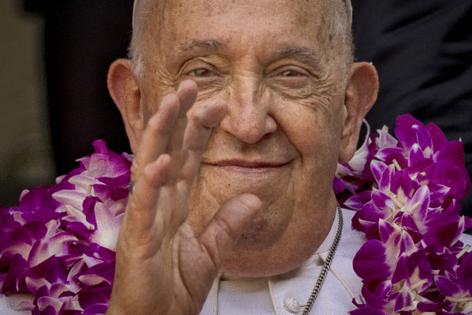Mark Gongloff: The next pope will help decide the planet's fate
Published in Op Eds
A symbolic turning point for U.S. climate policy, and by extension the world, happened when President Ronald Reagan removed the solar panels that his predecessor, Jimmy Carter, had installed at the White House, signaling a return to business as usual — i.e., burning more fossil fuels and hastening a growing climate crisis.
After the death of Pope Francis, the Roman Catholic Church’s choice of successor could be a similar sliding-doors moment. When much of the world, including its biggest economy, is retreating from climate activism and embracing a cynical climate “realism,” the Vatican has a chance to stand out by electing another vocal environmentalist to lead nearly 1.4 billion Catholics.
And as with Carter and Reagan, solar panels are involved again.
Roughly a decade before his death this weekend, Pope Francis had already established his credentials as the greenest pope of at least the fossil-fuel era. His landmark May 2015 encyclical Laudato Si’ made a compelling spiritual and moral case for protecting “our Sister, Mother Earth, who sustains and governs us,” but “now cries out to us because of the harm we have inflicted on her by our irresponsible use and abuse of the goods with which God has endowed her.”
The document, which author Bill McKibben suggests was “arguably the most important piece of writing so far this millennium,” helped motivate world leaders to set the aggressive global-heating targets of the Paris accord later that year. It also inspired the Laudato Si’ Movement, a network of hundreds of Catholic groups around the world dedicated to environmental protection and justice. The church’s Laudato Si’ Action Platform helps people, congregations and other groups find ways to take climate action.
Francis returned to the theme again and again, including his 2023 encyclical Laudate Deum, in which he expressed dismay that the world wasn’t living up to the ideals of the Paris agreement. Since then, he had to witness the U.S. government falling back into the hands of an even more extreme anti-environmentalist than Reagan. President Donald Trump has attacked climate science, clean-energy funding, regulations and even the use of the word “climate.” One of the pope’s last visitors was Vice President JD Vance, whose position on climate has shifted as his status within the Republican Party and donations from fossil-fuel companies have risen.
In a less-famous writing last June, Fratello Sole (“Brother Sun”), Francis ordered the construction of an agrivoltaic solar array on land on the outskirts of Rome, meant to provide enough juice for not only the Vatican’s radio station there but the entire city-state — possibly making it “the first nation powered entirely by the sun,” McKibben points out. With fanfare, the Vatican displayed new solar panels on its museum roof last December.
The conclave (which will sadly not involve Ralph Fiennes) to pick the next pope will be a wrestling match between traditionalists and reformers of Francis’ ilk, my Bloomberg Opinion colleague Howard Chua-Eoan notes. In that sense, Vatican politics may not be so different from regular politics, with its back-and-forth between liberals and conservatives. And just as much of the world’s politics have swung rightward recently, the church’s constituency has also grown more conservative. The next pope might consider environmental pleas a distraction from the office’s traditional role.
Maybe that pope won’t rip the solar panels from the Vatican roof. Maybe he’ll even let that agrivoltaic project to go forward. No matter what he does, he can’t possibly harm the climate cause as deeply as Trump and Vance are doing.
But by simply depriving the world of a powerful moral voice for action when so many other such voices are going quiet, a Catholic Church leader who ignores the climate can still do plenty of harm. During those brief times when Francis was alive and Trump was in office, you could ironically look to a millennia-old religious institution as being more forward-thinking about the environment than the U.S. government. To lose that example would be tragic.
____
This column reflects the personal views of the author and does not necessarily reflect the opinion of the editorial board or Bloomberg LP and its owners.
Mark Gongloff is a Bloomberg Opinion editor and columnist covering climate change. He previously worked for Fortune.com, the Huffington Post and the Wall Street Journal.
©2025 Bloomberg L.P. Visit bloomberg.com/opinion. Distributed by Tribune Content Agency, LLC.




























































Comments